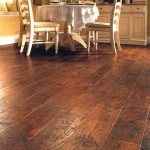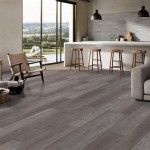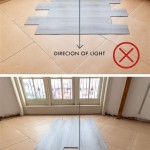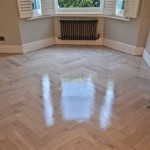Essential Aspects of Non-Toxic Vinyl Flooring
In today's eco-conscious environment, choosing flooring options with minimal environmental impact is paramount. Vinyl flooring, once perceived as a less desirable choice due to potential toxicity concerns, has undergone significant advancements in recent years, making it a viable and safe option for homeowners seeking non-toxic flooring solutions.
Understanding Vinyl Flooring Composition
Vinyl flooring is made primarily of polyvinyl chloride (PVC), a synthetic material. However, modern vinyl flooring often incorporates other components, such as wood flour, stone dust, or fiberglass, to enhance its durability and aesthetics. The key to non-toxic vinyl flooring lies in ensuring that these components are free of harmful substances and meet stringent safety standards.
Phthalate-Free Vinyl Flooring
Phthalates are chemicals commonly used to soften plastics. However, some phthalates have been linked to health concerns, including reproductive and developmental issues. To create non-toxic vinyl flooring, manufacturers have eliminated phthalates from their products, replacing them with safer alternatives.
Low-VOC Vinyl Flooring
Volatile organic compounds (VOCs) are chemicals that can be emitted into the air from certain building materials. Exposure to high levels of VOCs can cause respiratory irritation, headaches, and other health problems. Non-toxic vinyl flooring is designed to have low VOC emissions, ensuring a healthier indoor environment for your family.
Formaldehyde-Free Vinyl Flooring
Formaldehyde is a colorless gas with a strong odor. It is used in various building materials, including some vinyl flooring. Prolonged exposure to formaldehyde can irritate the eyes, nose, and throat. Non-toxic vinyl flooring is formaldehyde-free, eliminating this potential health hazard.
Certifications and Standards
To ensure the non-toxicity of vinyl flooring, reputable manufacturers obtain certifications from independent organizations. Look for products that carry certifications such as FloorScore, GreenGuard, or CRI Green Label Plus. These certifications guarantee that the flooring meets stringent health and environmental standards.
Benefits of Non-Toxic Vinyl Flooring
In addition to its non-toxic properties, vinyl flooring offers several other benefits, including:
- Durability: Vinyl flooring is highly durable and resistant to stains, scratches, and moisture.
- Water resistance: Non-toxic vinyl flooring is water-resistant, making it suitable for kitchens, bathrooms, and other areas prone to spills.
- Cost-effectiveness: Vinyl flooring is a relatively affordable flooring option compared to other materials such as hardwood or tile.
- Style and versatility: Non-toxic vinyl flooring comes in a wide range of styles, designs, and patterns, offering endless possibilities for interior décor.
Conclusion
Choosing non-toxic vinyl flooring is an excellent way to create a healthy and aesthetically pleasing living space. By understanding the essential aspects of non-toxic vinyl flooring, homeowners can make informed decisions about their flooring options, ensuring the safety and well-being of their families and the environment.

Toxin Free Luxury Vinyl Plank Flooring Healthy House On The Block

Toxin Free Luxury Vinyl Plank Flooring Healthy House On The Block

Are Vinyl Floors Toxic Olde Tyme Floor

Toxin Free Luxury Vinyl Plank Flooring Healthy House On The Block
A Guide To Non Toxic Flooring For Your Home

The Ultimate Guide To Non Toxic Flooring Atkinson Kirby
The Ultimate Guide To Non Toxic Flooring Atkinson Kirby
A Guide To Non Toxic Flooring For Your Home

What Are Vocs In Floors A Guide To Non Toxic Flooring Inc

The Dangers Of Luxury Vinyl Floors Lvt And How You Can Avoid Them Artisan Wood Llc
See Also







